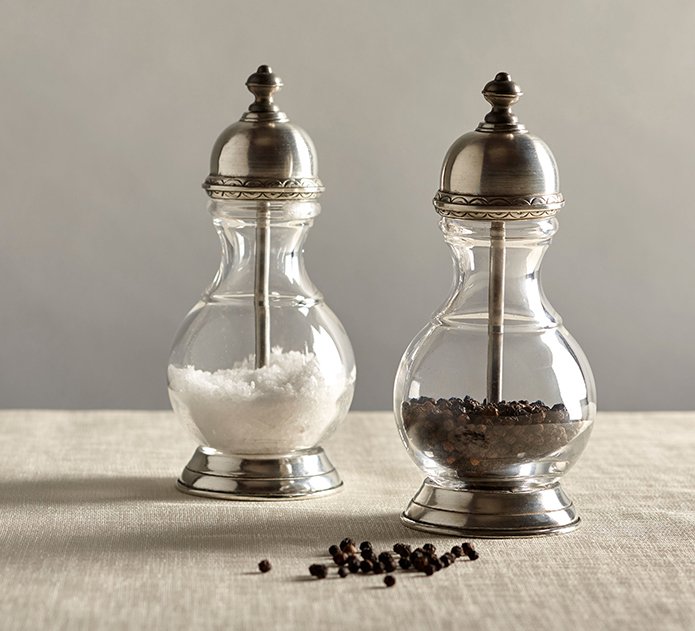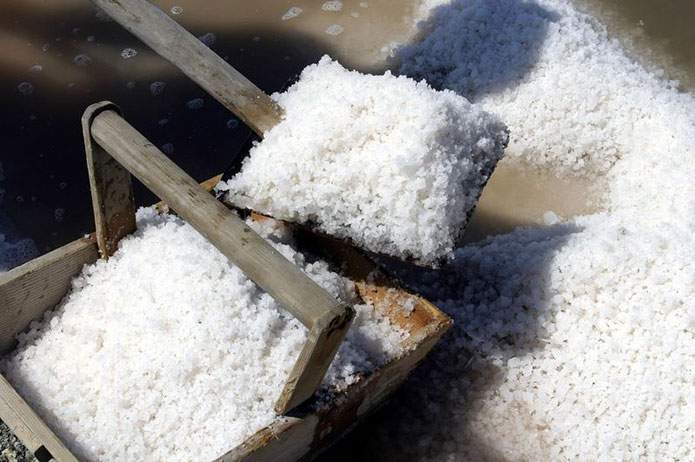
Both salt and pepper have from time immemorial been highly valued commodities, traded, smuggled, sold and bartered far across the world. They are deeply embedded in our universal consciousness as both vital, and yet every day, condiments.
Salt has traditionally been of high value, as it had to be painstakingly harvested in salt-pans, meticulously stored so it didn’t turn rancid, and has been a vital way of preserving food down the millennia, so, humble salt has long been a highly-prized product. Italy has an especially salty history; salt was harvested within the lagoons around Venice, which were dammed and managed by ‘salters’, then stockpiled in huge warehouses for bartering in leaner times, adding to the Venetian region’s wealth, power and status in ancient times. This monopoly, which extended around much of the Adriatic and the Mediterranean meant that the salt merchants grew rich from ‘white gold’, including the famous sweet salt of Cervia, which due to its climate and daily harvest doesn’t emit the bitter aftertaste found in most salt. Northern Italy was criss-crossed with salt-roads, where mule trains would transport tons of this modest looking yet important white substance hundreds of miles across mountainous passes. Although salt is no longer such a highly prized bounty, but is still vital to us – it is an essential mineral within a healthy balanced diet – our bodies need some salt, but not processed foods full of salt, instead, a twist of coarse sea salt in cooking is the simplest way of meeting this balance.
Historically, pepper also has been a valuable commodity, even a currency, again in ancient times in Italy, as it has been used to pay taxes, dowries and even ransoms, for example, when the Gauls invaded Rome (around 390 BC) they demanded 20,000 lbs of pepper as part of the ransom. In fact, the Romans would have been devastated as they loved their pepper – even peppering their desserts! Pepper has been referred to as ‘black gold’ – in Dutch ‘peperduur’ means something is “pepper expensive” – and the legal term ‘peppercorn rent’ meaning a token payment, part of a much larger amount, dates back to the Middle Ages when rents were sometimes paid in pepper as it was so expensive. History is peppered with pepper, especially the spice routes, exploration and colonisation. Today, an Italian meal out would not be the same without the waiter brandishing a huge pepper mill, poised to season your dish with freshly ground pepper from the side in one or two brisk twists, rather than having to get too ‘up-close-and’personal’… And imagine the Italian pasta staple Pasta Cacio e Pepe without freshly cracked black peppercorns, or the classic Margherita pizza, ‘less is more’ sacred in its simplicity of a crisp base, cheese, tomato, basil without the final twist or two or freshly ground black pepper…
Both salt and pepper are best served fresh, where possible, as pepper especially very quickly loses its flavour and aroma through oxidisation, evaporation and exposure to light, so to prevent this deterioration, airtight storage of the pepper corns, and immediate use when ground, is essential to preserve pepper’s ‘pep’. ‘Pep’ comes from the Latin ‘piper’ and has been used in a figurative sense to convey ‘energy’ or ‘spirit’ as far back as the Mid 19th Century, at least, this became shortened ‘pep’ in the early 20th century, in the saying “to ‘pep’ you up”, to boost and cheer you – and it has to be agreed that a twist of pepper adds a little boost to a meal. I must have Roman roots, as I start to panic if there is no pepper on the table… and I always add a pinch of sea-salt to my cooking…
Salt & pepper together are thought to bring good luck, so a set of cruets make a great wedding present or house-warming gift. This can be said to be due to salt’s legacy of preservation and longevity and pepper’s boosting ‘pep’. Both vital ingredients within a marriage or union.
However be careful you don’t spill the salt, or then the opposite may be true, as the spilling of salt is associated with bad luck, stemming from the Leonardo da Vinci’s painting of the last supper, where, if studied closely, it can be seen that Judas Iscariot has knocked over the salt with his elbow… if you do spill salt, don’t panic and expect catastrophe or biblical proportions, it can be remedied by a pinch thrown over your left shoulder, which is supposed to blind the devil waiting there…













